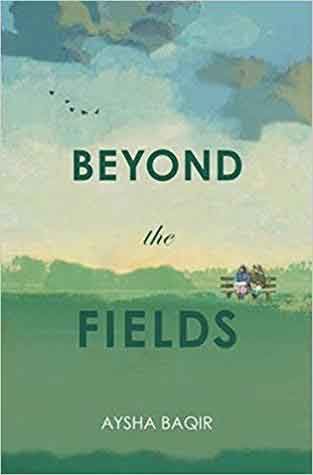
Title: Beyond the Fields
Author: Aysha Baqir
Publisher: Marshall Cavendish International, 2019
Recently, an instagram handle questioned women: “No Men for One day — What if there were no men for 24 hours?” Majority of the women replied that they would go for a walk alone. And this is the year 2020. We are living in a so called modern world where women are now freer than ever to pursue their ambitions and make a life of their own. But what does this fear of going out alone, for such a small task as an evening walk alone, tells us about our social system. If educated, independent women feel uneasy venturing out of their houses alone in advanced societies, then it isn’t difficult to imagine what women in socially and politically repressive systems go through.
In her debut novel, Aysha Baqir steers the reader’s gaze to a small village in 1980’s Pakistan, chronicling the lives of rural women whose existence was sanctified by the written and unwritten rules of the society. It was the time of Zia-ul-Haq’s reign and much controversial Hudood Ordinances.
Baqir grew up in Pakistan. After graduation, she won a scholarship to Mount Holyoke College where she studied International Relations. In 1998, she founded a pioneering not for profit economic development organization, Kaarvan Crafts Foundation, focused on poverty alleviation through the provision of business development and market-focused trainings for girls and women of rural Pakistan. Perhaps meeting those women and hearing their stories prompted Baqir to recount such stories of courage and defiance, even in the face of repression, which may become beacons of light for generations to come.
The narrative follows the life of a young Zara and her twin Tara. Poles apart in nature, they are bound by a sisterly affection for each other. Tara is the beautiful, fairer and obedient one from the duo who resigns herself readily to her mother’s desires and ideas. She is ready to get married as and when it pleases her parents. Zara, on the other hand is the rebel, who insists on studying though girls are not given education in their village. She is born in a society where more education for women is a matter of shame. If a woman reads or writes, would she be a good obedient housewife, good mother to her children? Would she be any good for the community?
Zara wishes to live her live abundantly, run amok in fields, eat Kairis from the trees, play outside, and study like her brother. It infuriates her, when more restrictions are imposed on her and Tara with the coming of age. That meant no going out alone and no playing and veiling themselves with burka even when stepping out with parents. Zara believes that she and her brother are equal, but for a life changing incident which brings her life to a halt.
It brings forth to her the reality of being a woman in her community — the brutal rape of her sister, the conduct of her parents in hiding it because it would bring shame to the family, their unwillingness to file a case because of Hudood ordinance in practice and then her subsequent marriage to someone in haste to veil the shame. When they lose contact with Tara and fear an unfortunate happening, it becomes too much for Zara, but she decides to find her sister.
This novel is the story of Zara’s grit and determination, her belief in the power of women in an unbalanced society, her conviction that she is not merely the body she inhabits but also the mind she possesses. She follows her sister to city, after convincing her parents, and plunges into the dangerous world of prostitution to bring back her sister.
Through this novel, the author attempts to bring forth the tribulations of women in such an oppressive system where it is not only the men but also women who play the agents of repression, to keep the system intact by inducing fear and shame in those who go wayward or rebel. In such systems, women are made subservient to imposed rules so much so that they accept them as code of honour even if adhering to them means hurting loved ones and acting against them.
Perhaps nothing could be more startling than the shaming of a rape victim or vilifying a woman who dares to fall in love. It is a system where the birth of a woman, in itself is a burden to family and a mother’s most important role is to suitably prepare them for marriage, to collect their dowry and start looking for prospective grooms when they come of age. Their propensity to literally dispose the girls as soon as possible, even takes over the maternal love which they only express by trying to put restrictions on their beloved daughters.
Baqir writes in a discreet manner and her narrative bears testimony to the amount of research and hard work which has gone into writing the book. For a reader from a neighbouring country, this book brings familiar sounds and smells which makes it more relatable. Local flavours are induced with the usage of Punjabi words. Word pairs are used to evoke the sense of belonging to familiar lands – playing on the concept of twins separated at birth. The ideas of women’s honour, shame and their bearing on family are comparable to that in India.
Though changes are questioning patriarchal mindsets, women’s emancipation continues still to be a tough battle. Beyond the Fields is an effort to highlight the struggle of women and an entreaty to be on the side of humanity, to break the shackles which stifle women who are born equal to men but are made to feel inferior by the rules of society.
Rakhi Dalal is an educator by profession. When not working, she can usually be found reading books or writing about reading them. She writes at https://rakhidalal.blogspot.com/ . She lives with her husband and a teenage son, who being sports lovers themselves are yet, after all these years, left surprised each time a book finds its way to their home.
Originally published in Borderless Journal
SIGN UP FOR COUNTERCURRENTS DAILY NEWSLETTER
















































